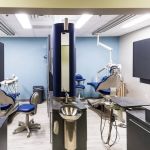- 1-What-Is-Jaw-Clicking-and-Tooth-Sensitivity
- 2-Common-Causes-of-Jaw-Clicking
- 3-Understanding-Tooth-Sensitivity
- 4-How-Jaw-Clicking-and-Tooth-Sensitivity-Are-Connected
- 5-Diagnosing-the-Causes
- 6-Treatment-Options-and-Management
What Is Jaw Clicking and Tooth Sensitivity?
Jaw clicking refers to the audible or palpable clicking sound occurring when opening or closing the mouth, often linked to temporomandibular joint (TMJ) disorders. Tooth sensitivity is characterized by a sharp, temporary pain in response to stimuli like cold, heat, or sweet foods. Both symptoms can cause discomfort and affect daily activities like eating and speaking.
Recognizing these symptoms early is crucial for preventing further oral complications and improving quality of life.
Common Causes of Jaw Clicking
Jaw clicking is most often caused by issues with the TMJ, such as disc displacement, arthritis, or muscle tension. Injury or trauma to the jaw can also contribute. Poor posture, stress-related teeth grinding (bruxism), and habitual jaw clenching are significant contributing factors.
In some cases, malocclusion (misalignment of teeth) may cause the jaw to move irregularly, producing clicking sounds. Understanding the root cause helps in selecting the appropriate treatment strategy.
Understanding Tooth Sensitivity
Tooth sensitivity arises when dentin—the layer beneath enamel—is exposed due to enamel erosion, gum recession, or tooth decay. Common causes include aggressive brushing, acidic diets, teeth grinding, and dental procedures.
Temperature changes or acidic foods can trigger nerve endings in exposed dentin, resulting in sharp pain. Timely dental care is essential to address sensitivity and prevent worsening conditions like cavities or gum disease.
How Jaw Clicking and Tooth Sensitivity Are Connected
While jaw clicking and tooth sensitivity may seem unrelated, they can be interconnected. TMJ disorders causing jaw misalignment or muscle tension can increase pressure on teeth, leading to enamel wear and sensitivity. Additionally, bruxism associated with jaw problems often accelerates tooth damage.
This overlap means patients experiencing both symptoms should seek comprehensive evaluation to address all contributing factors effectively.
Diagnosing the Causes
Accurate diagnosis involves a detailed dental and medical history, physical examination of the jaw and teeth, and imaging studies like X-rays or MRI if necessary. Dentists may assess bite alignment, joint function, and check for signs of bruxism or gum disease.
Early diagnosis facilitates targeted treatment plans, minimizing discomfort and preventing chronic issues.
Treatment Options and Management
Treatment varies depending on the underlying cause. For jaw clicking related to TMJ disorders, options include physical therapy, stress management, bite guards, or in severe cases, surgery. Tooth sensitivity treatments focus on using desensitizing toothpaste, fluoride applications, and avoiding triggers.
Maintaining good oral hygiene and regular dental check-ups are vital. For personalized care and expert advice, Dentistry Toothtruth offers tailored solutions to manage jaw clicking and tooth sensitivity effectively, helping patients regain comfort and confidence.







 ClearChoice Dental Implant Center4.0 (301 review)
ClearChoice Dental Implant Center4.0 (301 review) Southside Community Health Services4.0 (186 review)
Southside Community Health Services4.0 (186 review) Westborough Family Dental5.0 (71 review)
Westborough Family Dental5.0 (71 review) Kenneth W. Berger, DDS5.0 (79 review)
Kenneth W. Berger, DDS5.0 (79 review) Oral Surgery Services Inc4.0 (89 review)
Oral Surgery Services Inc4.0 (89 review) Rule Family Dentistry0.0 (0 review)
Rule Family Dentistry0.0 (0 review) The Importance of Oral Health Education During Pregnancy for a Healthy Pregnancy
The Importance of Oral Health Education During Pregnancy for a Healthy Pregnancy Best Tips for Brushing Your Teeth Properly for Healthy Gums: Essential Techniques for Oral Health
Best Tips for Brushing Your Teeth Properly for Healthy Gums: Essential Techniques for Oral Health Why Skipping Dental Checkups Can Lead to Bigger Oral Health Problems
Why Skipping Dental Checkups Can Lead to Bigger Oral Health Problems Advantages of Porcelain Dental Restorations
Advantages of Porcelain Dental Restorations How Can Diabetes Cause Tooth and Gum Problems? Preventing and Managing Oral Health Issues
How Can Diabetes Cause Tooth and Gum Problems? Preventing and Managing Oral Health Issues Healthy Habits for Promoting Good Oral Health and Hygiene: Tips for a Healthy Smile
Healthy Habits for Promoting Good Oral Health and Hygiene: Tips for a Healthy Smile